Relentless

Hope by George Frederic Watts, 1886
This image shows a lone blindfolded female figure sitting on a globe, playing a lyre that has only a single string remaining.
"This relentless siphon started defying simple gravity long ago …"
My hop vine, grown seven feet in a few short weeks, sparked my insight. I've come to think of it as my Hope Vine. I'd been reveling in spring, the great respite from winter's ravages, and wondering what I was witnessing, for this fresh season's beneficence seemed … what? … oh yea, Relentless. There has been no stopping it. A crashing hail storm pock-marked a few of the more delicate leaves and blossoms, but the expansion continued in earnest the following morning. The seeds I sowed without really knowing what they might become quickly sprouted and not even the neighbor cat using their planter for his bathroom discouraged their attempted dominion. Even the chokecherry, blighted as it seems, threw out fresh branches and suckers. Not even the endless-seeming setbacks through winter seem like barriers now, for I know how their progression turned out, or at least how it's turned out so far. A clear expansion relentlessly continues, with seemingly ever greater passion, no obvious end in sight.
We inhabit a tenaciously positive feedback loop where nothing seems capable of slowing or turning forward momentum.
Opacity
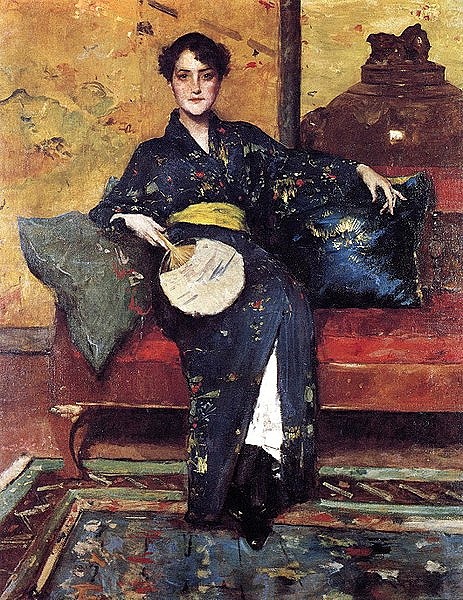
The Blue Kimono by Chase William Merritt, 1888
" … we must believe in something much more than nothing to amount to anything worth anything in this world."
Nobody usefully argues for full transparency because nobody really wants to see my kimono flapping open from neck to knee. A useful level of Opacity seems necessary to maintain civility, though nobody walks around wearing an impenetrable brick wall or black box. We quite properly keep our kimonos firmly belted to maintain a certain dignity, though we well understand that as a result not everything's on display. Fantasy fills in what fabric conceals, and those fantasies reveal perhaps more than any flapping open kimono ever could. Hopes and wishes, fears and dreads complete the presentation, imagination always insisting upon ever more disclosure. A delicate balance maintains decency between cleavage and knees, and not every observer seems all that pleased whatever that balance might reveal.
Any relationship predicated upon a presumption of full disclosure seems doomed from its start because only a part of anyone's impressions ever become fit for any other human's consumption
Anticiplaytion
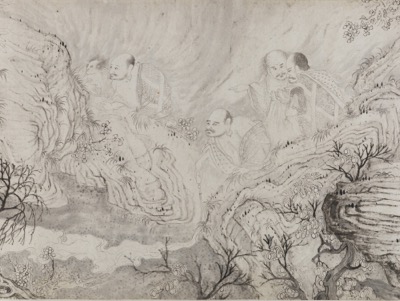
The Sixteen Luohans by Shitao (Zhu Ruoji), 1667
" … a post-graduate course in more warmly anticipating …"
It seems as though my days used to follow a certain cadence, each inducing its own rhythm. Mondays, I'd tidy up the place. Alternate Tuesdays would find me sorting recyclables. Wednesdays, I'd stop by the library. Thursdays, I'd shop to avoid the Friday crush. Fridays, I'd poke around in the yard. Saturdays and Sundays would bring a Farmers' Market excursion or two, extreme larder-stocking, and unrushed suppers with hot jazz beating in the background. Then the radio station cancelled the hot jazz program in favor of talking heads. We filled in with RadioDeluxe, a fine production but clearly lacking in Bix Beiderbecke tracks. Winter intervened to leave us snowbound. We were gone for a couple of weeks, returning with spring to be sequestered in place, snowbound without snow, no place to go. The Farmers' Markets didn't open this spring. Alternate Tuesdays still find me sorting recyclables, but the rest of my anticipations have gone arrhythmic. I can't coherently anticipate right now.
I imagine this condition a real world test of a long-considered situation.
Imprecision
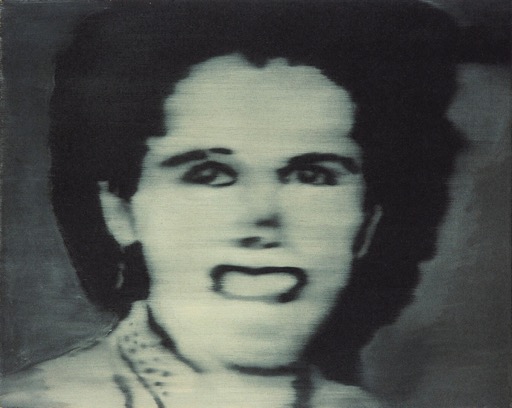
Gerhard Richter: Frau Marlow, 1964
" … revealing perhaps more than any of us care to recognize about reality and truth."
Back before the pandemic, when I could sometimes go out for morning coffee, the waitperson would often respond to my order by saying, "Perfect," as if we'd managed to achieve perfection together. I'd order my usual large (not Grande, thank you, or Venti … we are not in Italy and even in Italy, I chronically forget the proper word) decaf in a china cup and receive a "Perfect" in return. I'd noticed that this response had become common, so I was never surprised or shocked, but I remained curious about how such precision had entered into the most common of all transactions. It was "Perfect" here, "Perfect" there, and "Prefect" pretty nearly everywhere, while in what passes for real life, in ordinary times, perfection remained as it always had, slightly rarer than hen's teeth.
I figured that we might have forgotten how rare perfection always was and continues to be, as production values have exponentially increased.
I'mWithStoopid
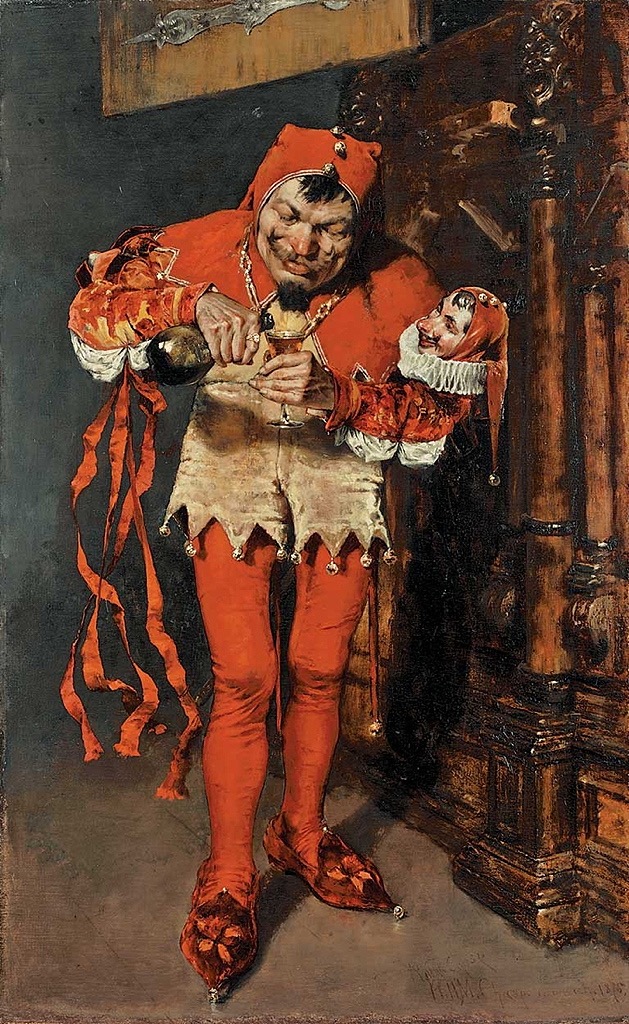
"Keying Up" – The Court Jester by William Merritt Chase, 1875
"I might never know what to say to any unmasked anyone."
I asked The Muse what I might say to someone not wearing a mask in public. She responded by reporting that she'd been considering just carrying around a few of her homemades, so she could generously offer them one, on the presumption that they might not own one. I thought that a fine strategy, though I notice that she hasn't yet started offering anyone this sort of assistance. Judging from the apparent belligerence of those choosing not to wear masks, her offer seems unlikely to attract many takers, though just one might reform my pessimism. I failed to convince my grand niece that two hundred thousand empirical observations might reasonably suggest that a medication might not prevent or cure Covid-19, but she insisted that the findings might have influenced her had they come from double blind testing, the very sort impossible to perform during an actual pandemic. She was married to her perspective. The more I argued counter to her preconceptions, the stupider I seemed to become in her eyes. Stupid in anyone's eyes renders impossible any seeing eye to eye.
Even a casual observer can't help but notice that our world seems filled with utter stupidity.
Eigenvaluing
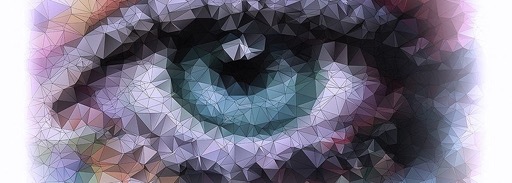
"Together, we might not get anywhere but where we always go and where we seem to belong, anyway."
Each relationship seems to resolve to a certain eigenvalue, a self-similar resolution. When a relationship becomes dominated by a single personality, a Me Me Me Me Me Relationship, it resolves to an eigenvalue of one, reputed to be the loneliest number. Other relationships seem to reliably reproduce certain shapes, the triangle being one of the more common. In these, every issue seems to have three sides, like when a mother-in-law seems to get involved in every decision, the two principals might struggle to find unaided resolutions. Families quite pre-consciously replicate reliably similar shapes, some deeply influenced by a forceful father or a tenaciously unruly child. Whenever they engage, they seem to play to the same stymie. Some relationships reliably replicate dissatisfaction while others produce great delight. It's a great mystery why relationships behave in this way, but they certainly seem to eventually project certain predictable outcomes upon themselves. Some seem especially blessed and others, unusually cursed, reliably fractal, each in their own unique way.
Those trying to shape this charge, this strangely-attracting force, often simply make matters worse, adopting one after another seemingly inevitably failing improvement strategy.
Anniverstory
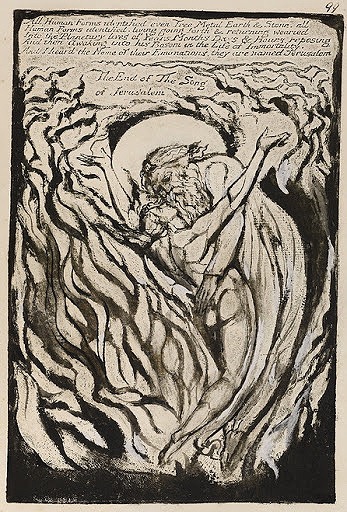
The End of the Song of Jerusalem, William Blake, 1827
" … what actually came to pass one day but never, ever went away."
The crabapple trees were in full and glorious bloom. The iris bed across the front had just begun showing color. The house, still white with garish blue window trim in those days before I'd stripped it to bare wood to repaint it caperberry green. The rose garden and the spreading, ancient apricot were still in their more primitive forms, time's ravages yet before them. Family and friends gathered to witness The Muse and I marrying. We'd planned a fitting celebration with fairy lights strung in trees and all along the arbor over the back deck. James flew over from Seattle to serve as our chef. We bought Copper River Sockeye filets and huge bags of fresh-cut asparagus and enough strawberries to more than feed the multitude. The Muse's Aunt Lillian tottered around the yard, leaning over her walker to pull errant weeds. Everyone who attended accepted an assignment to do something, for this would be a Do It All By Ourselves affair.
The preacher drove over from Beaverton with his partner, both heavily tattooed and pierced. The Muse's siblings and cousins came vast distances to join the celebration.
Unmasking
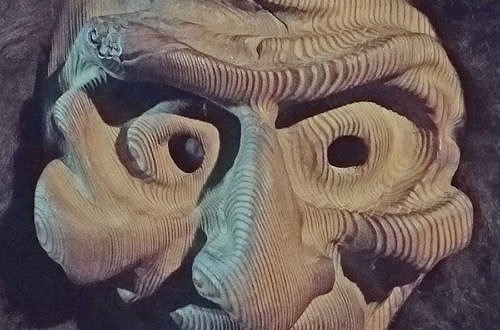
"Clothes make up the man more than make him."
Writing this morning, New York Times columnist Maureen Dowd commented on Our President's mask peccadillo, how his refusal to wear the mask his administration prescribes unmasks him and how his insistence upon constantly projecting a public personna has left him without evident personal identity. Nobody has a clue who he might really be beneath his masking exterior, which leaves him a definite minority in a society increasingly identifying itself as dedicated mask wearers. Our new masks don't so much cloak as identify who's careful and who's careless, who's courteous and who's contemptuous, who's comfortable demonstrating their vulnerability and who's in reckless denial. Curiously, as Dowd notes, our great masking seems to have unmasked who we more authentically are, with those too awfully invested in playing dress up suddenly relegated a lower social standing.
The America I grew up in performed like a continuous carnival with each in the costume commensurate to their role.
QueuingUp

"I foresee a day when meat might become, for a time, flavoring more than centerpiece entree …"
I really should have paid closer attention through Junior High, for I contend that every life lesson worth learning was woven into that experience, few of them during actual classes. Those years now seem as though they were a perfectly crafted passion play, a junior soap opera with every archetypal character present. Lunchtime seemed especially rich. Each clique would congregate around their table, territorial and exclusive. The sack lunchers segregated from those rich enough to cough up the thirty-five cents for a hot meal. Whatever the class, everyone ended up QueuingUp, waiting 'on' or 'in' line for something. Americans have never been naturally skilled at QueuingUp. Where I come from, line standing was for foreign cultures and big city people. Us small city people might line up for a football game or Forth Of July fireworks, but our daily lives rarely required us to wait for anything. Our heritage seemed to be instant gratification, except for the excruciatingly slow queue in the junior high school lunch room.
The pandemic has popularized QueuingUp like I've never seen.
WeightingHeavily
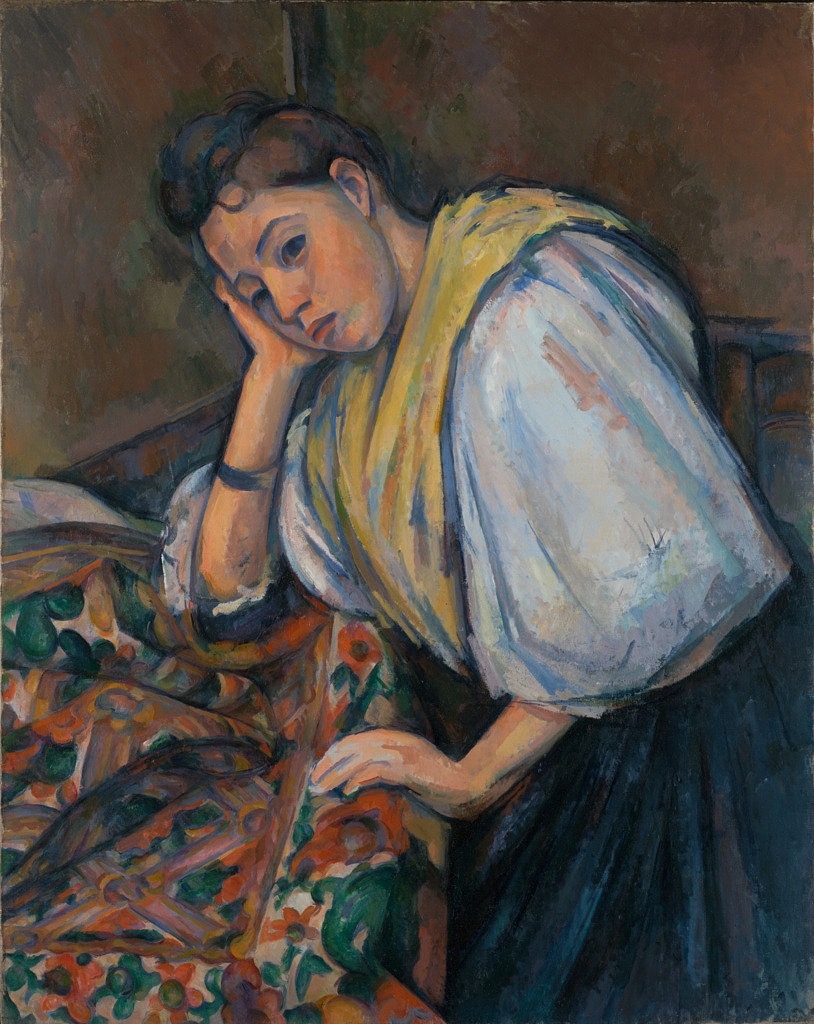
Paul Cézanne, Young Italian Woman at a Table, about 1895–1900
"Pandemics progress by such insignificant increments …"
I imagine myself trapped in a waiting room with time weighing heavily upon my soul, no real place to go, Weighting. C. S. Lewis might have imagined this place, every seat as hard as an old bench and none comfortable. I stand beside my possessions, which I've stuffed into an oddly-shaped knapsack, which seems a tad too heavy and awkward to handle. I'm weary of standing and cannot quite bring myself to sit. I want to wander over toward the newsstand, but I'd have to drag my knapsack along and I cannot quite face that chore. Besides, I know what I'll find at the newsstand: stale candy I wouldn't choose to buy if it was fresh, yesterday's headlines posing as news, a haze of cheap cigar smoke ringing the place. My train (or will it be a bus?) would be running way late if it was running on anything like a schedule. My destination unknowable, departure time up in the air, I could be waiting anywhere, but I seem to be Weighting nowhere at all.
I spent much of this writing week deferring, missing even my own meager deadlines.
NoPlaceToChide
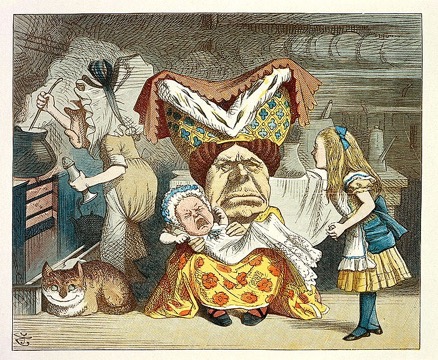
Illustration from The Nursery "Alice", from John Tenniel's illustrations to "Alice's Adventures in Wonderland," 1890
"I am neither my neighbor's critic nor her champion."
Have you noticed that The Chattering Class has lost its class? No longer does mere difference of perspective divide us and discourse hold promise. Public derision widens our divisions, encouraging them, rendering unthinkable even civilly agreeing to disagree. Daring to speak my mind might find me publicly derided as a fully fledged Enemy of the State, arriving far too late for any hope of receiving redemption. "Off with her head," some social media Red Queen says, and headhunters appear to jeer and shout down. Can anyone dishonorably defend their honor? I find myself wondering, "Who stole your trike?", for the spite seems inborn, a carefully nurtured identity, a grand and glorious begrudgement of the first degree. Taking offense seems no longer offensive, but an anticipated if overly-defensive response. A simple question seems likely to bring brimstone down upon the questioner and a curious social standing upon the devil delivering it. Dogs eat dogs and pups routinely eat puppies now, every issue a dogfight to the death.
The death of civil discourse arrived on little cat's feet, greeting us as warmly as might any savior.
IllAtEase
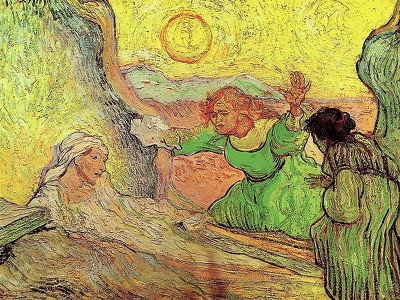
The Raising of Lazarus after Rembrandt by Vincent van Gogh (1890).
" … having apparently traded in my innate senses for a double handful of IllAtEase."
This pandemic provides uneasy respite. The Muse suggests that we're better off if we just assume that we're infected and throwing off virus like one of those hose-tracking garden sprinklers. I imagine that everyone I encounter's doing likewise and that I'm not successfully dodging their bullets, so I slather sanitizer before and after every excursion. An ancient adage insisted that a dream come true amounts to the most insidious punishment, and the now interminable pandemic seems the perfect foil for any former aspiration to spend more leisure time with family. Time moves most slowly when held under this kind of lock and key, where nothing physically inhibits me, but where a certain moral sense suspends me in place. I do the right thing without the expected consequent feeling very good about my choice. Nobody notices my generous absences and nobody rejoices over my tacit contributions. The Muse wonders where I've gone and I respond by asking where in this constraining space I might feel safe to manifest. I feel distinctly IllAtEase.
Sleep produces no rest, but seems to encourage an ever-deepening restlessness; a Lazarus death.
NumberPunching
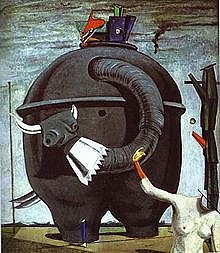
The Elephant Celebes, Max Ernst, 1921
" … at least one piñata short of a party."
Covid-19 case counts suggest whatever the watchman damned well wants them to suggest. Raw numbers seem to be inconsistently reported due to a near absence of testing. Some officials seriously support sponsoring fewer tests, since increased testing just seems to inflate the case numbers. Some firms and localities refuse to even discuss test results, insisting that they're thereby providing an important public service by preventing panic among people who might not properly interpret findings. One governor of an early-opening state has repeatedly privately apologized for releasing, with considerable fanfare, data which only showed a reduction of new cases because of what he later quietly referred to as "sorting errors." Who sorts data so that April follows May? Multiple times? NumberPunchers do.
A NumberPuncher professionally muddies waters.
Crow-Ding
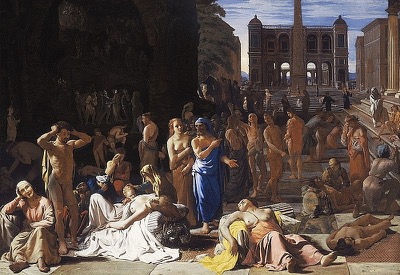
Plague in an Ancient City, Michiel Sweerts, c. 1652–1654
"I'm no more ready to return to what passed for normal than I was prepared to inhabit that normal when it was here before."
If we refer to a crowd of crows as a 'murder,' a crowd of HomeDespot shoppers might reasonably be referred to as a 'suicide' of shoppers, for the context seems to insist upon a shopper's acceptance of suicidal risk as the price of entry. The door monitor, outfitted in fetching blaze orange vest and weary-looking face mask, turns back no-one, but seems posted as a public genuflection to a government recommendation and not as any serious enforcement. The aisles might be marked with fresh masking tape arrows which no more than vaguely hint at a form of traffic control, but I don't know the layout well enough to understand how to get where I'm going should I follow their subtle advice. I don't even notice their presence until I'm halfway there and the side aisle seems to have been blocked off for some lift truck work. I'm stuck however I go. By the grace of one of the genuinely lesser gods, I find what I came looking for, but I abandon whatever hope I carried in with me when I see fresh chaos at the checkout stands, with unruly aisles-full of overfilled carts and impatient customers. I return my prospective purchases back to the shelf display from whence they came, wheedling my way past clutches of husband and wife tag teams leisurely blocking my way, and exit the store to slather my hands in sanitizer and slink back home. I should have known better than to have ever entered there, me and my surviving hope to find better.
My history with crowds and consequent Crow-Ding (that warning klaxon sounding in my head whenever entering a crowd) informs my relationship with them now.
RustySpring
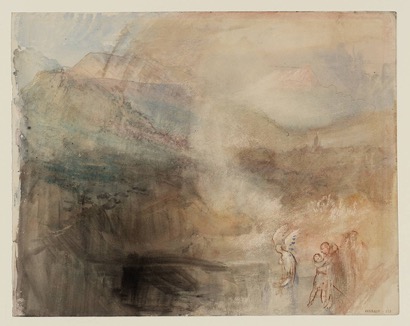
Joseph Mallord William Turner, The Angel Troubling the Pool, c.1845
'Now there is at Jerusalem by the sheep market a pool, which is called in the Hebrew tongue Bethesda, having five porches. In these lay a great multitude of impotent folk, of blind, halt, withered; waiting for the movement of the water. For an angel went down at a certain season into the pool, and troubled the water; whosoever then first after the troubling of the water stepped in was made whole of whatsoever disease he had.' John 5.2-4
" … in need of an angel or two to trouble overlong-still waters."
Spring finally arrived after six full months of winter. Through the short days and the early lengthening ones, I survived on my usual time-worn fantasy, that if I was not snowed in, I would be out in my garden, on my knees, praising all creation, troubling dirt. I fondly fantasized about really taking control of my landscaping, culling rocks and loosening soil until the yard looked like a Sunset® Magazine cover. Once spring came, though, I watched myself milling around the periphery of the pool awaiting the arrival of an angel, I suppose, as if I needed permission to begin. I thought the season a false one at first, distrusting the prankster weather, disbelieving that the snows had actually passed, even after the snowbank melted into nothing more threatening than ground moisture. I'd all winter imagined myself simply springing back after hibernation, but I found myself rusty and distinctly less resilient than I'd remembered myself being before.
Resilience seems to be one of those overblown concepts, the kind that imagine much differently than they ever manifest.
HasteningQuickly
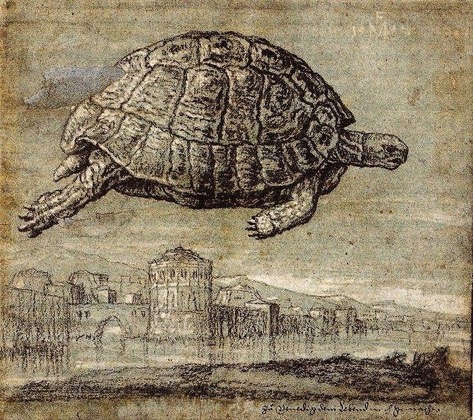
Tortoise above Venetian lagoon, Melchior Lorch, 1555
"Expect the skunkworks to fizzle after stinking up the joint."
Project Management's first principle, often ignored, insists that one must Hasten Slowly, for even The Ancients understood that each human activity held a natural cadence, worthy of respect, and that attempts to violate that rhythm reliably produced calamity. The human brain seems most skilled at imagining utter impossibilities. We experience an inconvenience and easily imagine better, faster, and cheaper ways to achieve that end, means which seem likely to produce less inconvenience. In practice, most of the time (not by any means all of the time) we produce greater calamity when attempting to speed up things. We shave subtle essentials like testing, for instance, which seems to produce no immediate value, even further slowing development when productive resource gets sidetracked fixing pesky bugs. We remain steadfastly capable of reducing any effort down to apparent essentials, eliminating what we, under duress, easily classify as trivial distractions, deferring any deeper appreciation of O-ring chemistry, for instance, until an even more inconvenient time. We take great pride at 'making our date.'
HasteningQuickly becomes ever more seductive when experiencing a critical necessity, like during a pandemic.
AskChewing
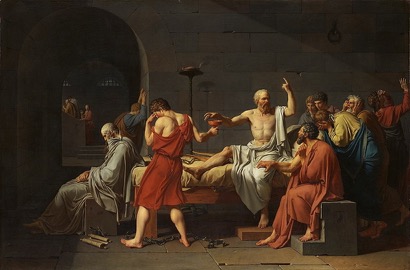
The Death of Socrates by Jacques-Louis David, 1787
"My foibles seem more prominently displayed than my mastery"
I once engaged in frenzied ten hour marathons of yard work whenever Spring finally came, as if I'd stockpiled overwinter energy and it was approaching its pull date. I'd rake and prune and mow and dig, leaving a cluttered pile of debris behind me, then drag that jumble out into an uneasy pile beside the driveway. I'd call Kevin with his trailer and pay him a hundred bucks to haul that mess to the dump or cut the shrubbery into small enough pieces that I could fill the yard debris container for weeks into the future. I'd end those days utterly exhausted and also utterly exhilarated, holding a feeling of mastery and dominion that winter had so recently successfully held at bay. These were genuine red letter days, memorable for the ten thousand ways I'd managed to overcome all the usual complications, my own initiating motivation not the least of these. I would have spent the better part of at least a week thinking through an effort that only engagement could ever resolve, telling myself that I was not so much procrastinating, but carefully planning. I was actually procrastinating, for such a momentous engagement awed me from before its outset. I both relished and feared the work.
Now, I tend to parcel out the springtime yard work into two hour pieces, distributing it over the opening weeks of the season.
Morpidity
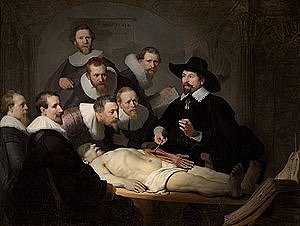
The Anatomy Lesson of Dr. Nicolaes Tulp: Rembrandt, 1632
"Our own innocence seems most vulnerable."
Up against The Ides of May, and best guess estimates of the number of pandemic casualties in the You Ess of A exceeds the number lost in all the wars we've engaged in since 1950. That's four and a half months to exceed the number of war dead over the prior seventy years, and we've been continuously engaged in war over that time. Some still doubt whether this epidemic hasn't been overblown for political dominion, with armed self-proclaimed militia "safeguarding" the "rights" of certain shopkeepers to encourage conditions shown to stimulate the virus' spread. Most of the dead seem innocent enough, having contracted the bug from inadvertent contact. I saw last night on television an interview with a top virologist who was recovering from a bout he figures he'd caught while on a flight to New Orleans last month. He wore a mask and gloves and carried his handy hand sanitizer, and had decades of experience working with killer viruses, but he still caught the damned thing. This bug respects nobody's God-granted or constitutionally-guaranteed rights to life or liberty, let alone the pursuit of simple happiness.
The Wisconsin Supreme Court overturned their governor's extension of his stay-at-home order, the justices insisting that he'd over-reached his legal powers in attempting to limit the possibility that some might otherwise needlessly die from viral infection.
Pauseperity
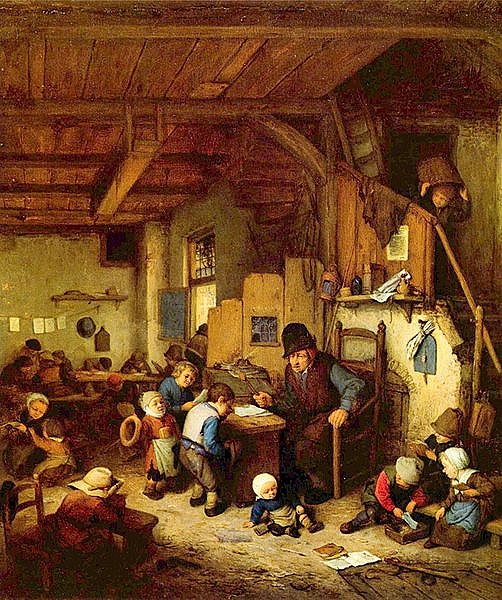
Adriaen van Ostade: The Schoolmaster, 1662
"What doesn't humble you makes you smug."
Our Pandemic has paused our planned prosperity. The Pestilence Horseman of the Dreaded Apocalypse rides roughshod through our society, heartlessly mowing down more than our fellows, for avoiding him drove us to flee from our jobs, our schools, and our precious, precocious society. One day, our economy seemed to be humming right along. The next day, it forgot that song: words, tune, the whole shebang. Even those who had subscribed to the widely popular Prosperity Gospel suspended their pursuit when manifestation moved from being a simple matter of personal motivation to one of humbled recognition and acceptance. Overnight, consumption turned cruelly inconspicuous when not even a stockpile of Benjamins could buy you toilet paper. We became jobless paper paupers instead of employed paper prosperous, suddenly unable to maintain appearances. Flow stalled.
The I Ching spoke of disruptive calamity overturning accustomed order, but those stories seemed more like history than current affairs.
GroaningUp
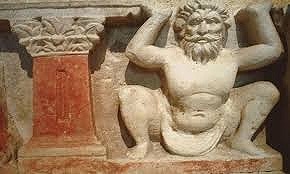
"We each hold our world on our shoulder and we are each still GroaningUp …"
The Greek God Atlas held the world on his shoulders, a curious career choice. I suppose world holding's necessary work, but necessary of the sort that someone else should do. It's a utility position, one with little self-promotional possibilities, offering no leave and little potential for advancement. It's maintenance work. Though Atlas is usually depicted wrapped in swaddling clothes, I imagine him dressed in J. C. Penney khaki work clothes and Red Wing work boots, like the janitor at my grade school wore, for he, too, inhabited the nether region of my world, down where the coal furnace belched heat and the teachers fled to smoke. The place everyone knew was there but nobody spoke about.
I later came to understand that Atlas' story served as an allegory for the all too human condition, for each of us holds a world upon our shoulders.
PandemicAmish

"I seem to have little to lose by dropping a century or two from my lifestyle."
As our pandemic disrupted lengthy supply chains, a certain simplicity seemed to emerge. The NYTimes Food Section features more recipes for dishes not traditionally found there, like beans and casseroles. Supermarket Ingredient sections seem hardest hit, with flour, pasta, and beans frequently unavailable for any price. Restrictions limiting a shopper to one or two of certain items have become commonplace. Our larder has consequently become more strategic and The Muse and I have increasingly become stockpilers, grabbing whatever's available when we spot it. The smaller shops seem better stocked. Thank heavens that our food security seems so far unthreatened, but our meals, always fairly simple affairs, have become even simpler, with fewer exotic fruits and vegetables and more reliable old familiars.
I've been reading a series of novels set around Ohio's Amish communities, and I sense a certain simplicity settling into our pandemic lifestyle.
History-onics
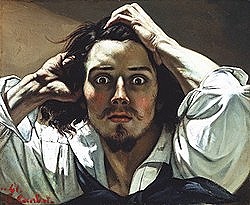
Le Désespéré (The Desperate Man), Gustave Courbet, circa 1843
"Suspended between two great mysteries, I face into another day."
I become a truly desperate man when asked about my past. I feel reasonably certain that I've had one—or several—but I don't recall specifics. I can't remember faces and must painstakingly reconstruct places and times. I didn't keep records other than journals and the few dated pieces of writing I've retained, many of them stored in formats now unreadable. Pass me a common "intake form" and I draw a blank, for I truly do not know. With considerable prompting, I might create a believable fiction, plugging dates and events to produce what might appear to be a credible history, but this will not resolve the fundamental mystery for me and will prove largely fictional in practice, should any of the details become critical for diagnosis or treatment. My past seems every bit as fictional and speculative as my future.
The pandemic has spawned a booming business in obituaries, half-page histories of those who've died.
ExtremeDomestification
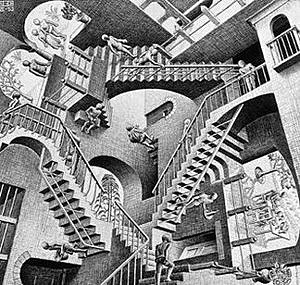
Relativity, lithographic print by M. C. Escher, 1953
"ExtremeDomestification seems to be positively effecting even the most feral among us …"
When under duress, I search for a reframe. My mother taught me at a very early age that toast never actually burns, but sometimes browns rather extremely. I grew to extend that response pattern into a lifestyle where my first (and often best) reaction to any adversity involved reframing the story. A bout of seasonal flu became a forced vacation. Car trouble wouldn't leave me stranded but engaging in an unplanned adventure where I might have to invent a new way to get back home. Doors didn't close behind but opened ahead. I found that I could safely reframe in response to what I otherwise might have classified as calamity, and thus retain some sense of control. I get to write my own story.
My reframing self might describe the Governor's Stay At Home Directive as ExtremeDomestification, for its effect has been to encourage transformation of what might have started as an authentic homebody into something more resembling a home soul, someone more than married to home life, but conscripted into it, sentenced to serve an indeterminate term with no reduction in sentence for good behavior.
Pretensal

Self-portrait, Jacques-Louis David (1794).
He was a dictator of the arts under the French Republic.
'Among the calamities of war may be jointly numbered the diminution of the love of truth, by the falsehoods which interest dictates and credulity encourages.' Samuel Johnson, from The Idler, 1758
"I intend to cast about for reassurances without pretense."
I compensate for my persistent lack of access to The Truth by embracing candor. I can certainly describe how things seem to be to me, understanding that this perspective might not have ever had the pleasure of actually meeting The Truth, but I at least own it. I can and often do leave myself feeling uncomfortable with my candor, understanding that popularity prefers me to project greater pretense, lest someone think the less of me. It's apparently a great sin for anyone to think the less of me. While I might certainly prefer everyone to appreciate my scribblings, I've been trying to get over the need to please, for that need alone can leave me a prisoner to pretense, poised atop a teetering tower of questionable premises.
Our current administration does daily battle with candor, a fresh poster child in a long line of similar poster children posing behind pretense.
NegativeSpace
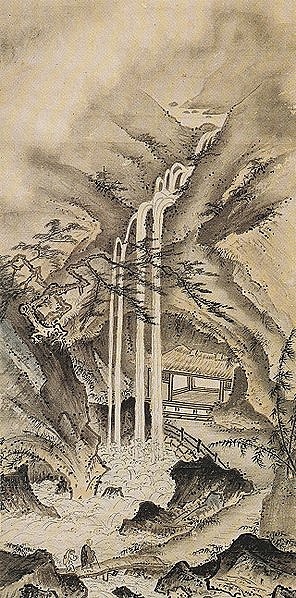
"Looking at a Waterfall", Geiami, 1480
"They seem to be discovering a world I desperately need …"
In the Japanese painter Geiami's Looking at a Waterfall, the focal point of the work, the waterfall, seems like negative space composed of the space leftover after he painted everything surrounding the waterfall. The painting plays positive off of negative to produce a seemingly complete image. Life, too, seems to present in this way. From my writing chair, the visible ridgeline seems projected against a negative background of sky, where nothing but 'not ridgeline' resides. The off-white wall between this room and the kitchen appears as a interruption, a negative space visually cutting off counter, chair, and floor when viewed from my writing chair. These words depend upon NegativeSpaces framing them. Even the now long-lived Stay At Home Order serves as a Negative Outcome Objective, its purpose being to avoid a result rather than to acquire one. Pandemics produce NegativeSpaces, haves and have-nots, where the have-nots seem to dominate.
I've been noticing how seductive the newly prominent NegativeSpaces seem.
Maudling
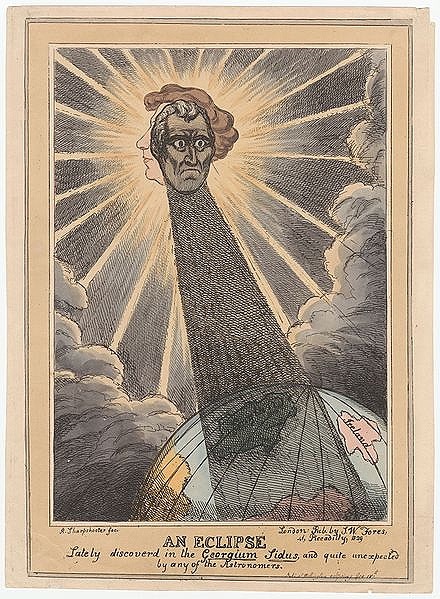
A satirical cartoon attacking the Duke of Wellington, then Prime Minister, for the passage in April 1829 of the Roman Catholic Relief Act
"We're still nattering over tactics, Maudling our way into an increasingly perilous future of our own creation."
My first project management assignment came over a lunch, from someone I didn't at the time report to who managed a department in another division of the company. A succession of actual project managers had failed to tame an effort, so my name had come up, probably over another lunch, where his VP and my VP had reached an agreement that perhaps informally assigning Schmaltz as a sort of stealth project manager might finally tether the aspiring initiative. I was told, as a first step, to, "go get the plan." Naive me, never before having managed a project, I set out on what would become just another chapter in a never-ending saga to find a reliable plan for the initiative. I'd initially thought my predecessors delinquent for having failed to at least produce a plan, though I later learned that a) no plan had ever existed because b) the effort was inherently unplannable. Those VPs who had so blithely recommended assigning me to fix the so-called project had abrogated their responsibility, for this project had no strategic intent, and no two people I spoke with while searching in vain for the plan, agreed upon the purpose of the project. I never did manage to produce a credible plan before the executives wisely chose to cancel funding for that woe begotten excursion after the fifth or sixth time that I'd reminded them that they'd need to decide upon some strategic intent before the effort could ever hope to satisfy them.
I mention this story at this time because it seems to inform our current dilemma in our ongoing battle against the insidious Covid-19 virus.
Doldrums
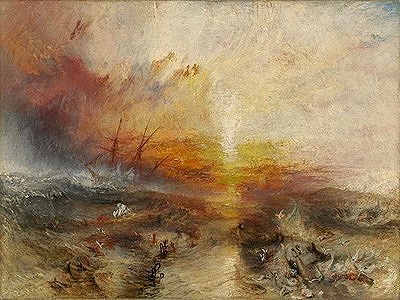
Slavers Throwing overboard the Dead and Dying—Typhoon coming on, J. M. W. Turner, 1840
"Adventure still awaits our arrival, entirely dependent upon our short-term survival."
We left port with reports of steady trade winds ahead, though those left us after two months at sea to find us beating across the Horse Latitudes of this pandemic. We lost the steady sensation of forward progress to enter a vast sea, seemingly endless, and so our originating purpose naturally diminished until we felt as though we held no aspirations save for the most primitive personal preservation. The crew grew increasingly restless as our collective helplessness came into ever sharper focus. With stores waning and patience at a premium, a certain feral nature overcame us. We lost our usual courtesies and decorums. We completed chores listlessly and suppers became sullen affairs with little evident cheer or hopefulness. We'd entered the Doldrums.
A second breadwinner in our extended family received his layoff notice this week.
Banqueting
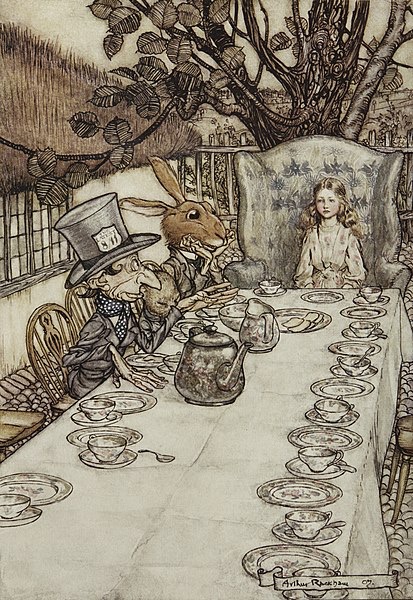
"A Mad Tea Party" by Arthur Rackham, from a 1907 edition of Alice's Adventures in Wonderland
" … like family turned recursive, …"
Every month or two, B. C., The Muse and I would host some sort of supper party. Often, when a group of visiting scholars or such would be in town for a conference, meeting, or workshop, The Muse would invite the whole gang, instructing me to prepare for fifteen to thirty, with no real way to verify how many might actually attend. I'd plead for information about food preferences and prejudices and eventually just end up making two or three or four suppers in one, so as to not too deeply offend the vegan, gluten-free, paleo, or pescatarian, for at least one of each was always certain to attend. I'd spend a day cleaning house and prepping food. We'd pull out the good china tablecloths and pretend that we always lived that way. The food never ended up being the centerpiece, though. The conversations filled out the proceedings as our guests made connections they could not have possibly made within the constraints of their regularly scheduled meetings.
These were inevitably enlivening evenings where, even though I'd end up staying up way past my usual bedtime, everyone seemed to leave feeling richer than when they arrived.
Eyedentity
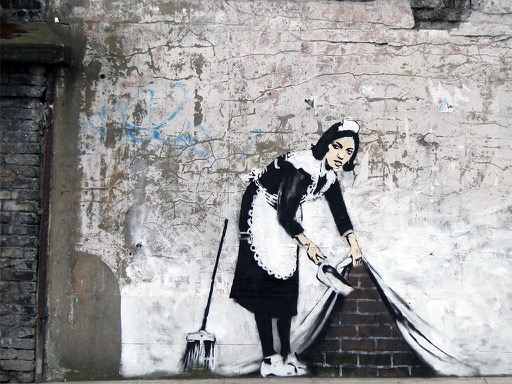
Banksy: French Maid, 2008 (Shoreditch, London street art)
"I could claim to be adapting, but I'm more emphatically faking it for now …"
I peer into my shaving mirror and see an aging Emeritus Professor of Ancient Languages in dire need of a haircut peering back out at me. I search, it seems, in vain for my usual cues while standing at something resembling parade rest, wondering where my initiative went. The season seems to be moving as seasons do, inexorably into, while I wait like a hesitant jump-roper to leap into each new day. I can't seem to find the old rhythm most days, and even when I catch a glimpse of it, the old timing seems somehow off and I'm caught tripping over my three left feet. In pre-pandemic days, my god-given two left feet seemed to serve me well enough. That third one, apparently sprouted since the disruption, often renders me flummoxed and confused. I usually find no clear clue what I should do next, … or before, either.
Some so-called primitive cultures forbade mirrors, claiming that they encourage unseemly vanity and worse, that they might steal souls.
ThUs
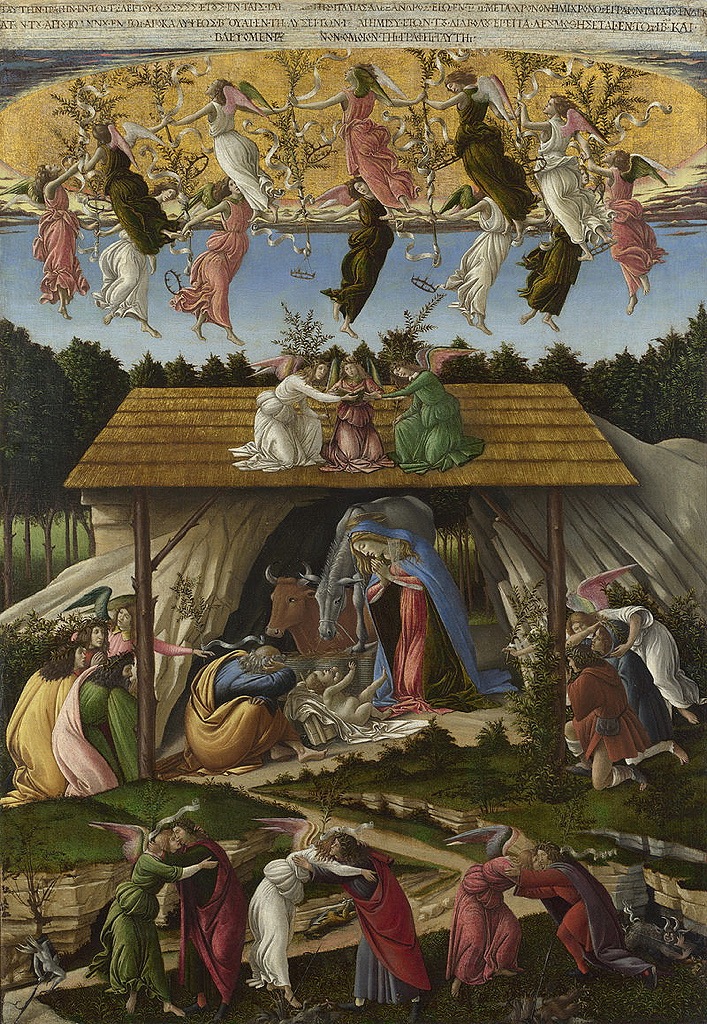
The Mystical Nativity, Sandro Botticelli, c. 1500–1501
Forget The Melting Pot, we're more rightly a stew.
In Botticelli's Renaissance masterwork The Mystical Nativity, symbolism seems thicker than the paint. He tried to depict the end of an apocalyptic time, when, after three and a half years rampaging around in the world, The Devil and his associates were relegated back into the underworld from which they came. Creepy looking angels dance above while others embrace "men of goodwill" along the bottom of the work. Both Mary and the Baby Jesus appear larger than life, a throwback perspective from times when photographic projection was often modified, with most important objects inflated larger than supporting ones. Overall, it appears as a busy image, but depicts a joyful time, for it shows a great evil exiting the world.
Some within each generation before and since sincerely believed that they were the chosen few, the ones intended to actually experience the apocalypse, apparently a longed-for honor among True Believers.
NewAbnormal
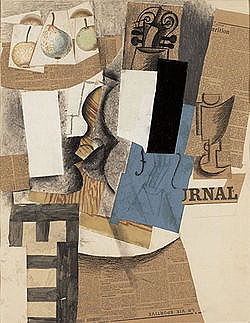
Composition with Fruit, Guitar and Glass, Pablo Picasso, 1912
"My job, our job, seems to be to out appreciate our Old Masters."
Abstraction did not take the art world by storm, but by slow accretion, for the art world reacted to this change not as an opportunity, but as a threat to tradition. Societies care about tradition because their identity lies there, reinforced by the familiar and seemingly threatened by difference. Past masters serve as exemplars, and gatekeepers insist upon fresh works properly respecting pre-existing works without actually plagiarizing them. Revolutions knock on doors for decades before anyone opens in response. Progress leaves snails feeling smuggy about their swiftness. Once the door opens a crack, it might seem to fly wide open in an instant, but those artists who idled in enforced obscurity for decades understand than the orthodoxy never really wanted anything to change and will continue trying to subsume them into conservative normalcy in lieu of actually accepting the changes they bring.
I hear much mumbling about new normals, generally idle speculations about what will likely irreversibly change once our pandemic recedes.


